Once upon a time, both Paul “Triple H” Leveque and Jeff Jarrett had extremely distinct reputations among the wrestling fandom. These were not positive reputations. In the year 2025, it seems like both men have completely rehabilitated whatever negative reputations they may have had twenty years ago: Jeff Jarrett is seen as a fun sort of old uncle personality and Triple H has ascended to the top of the WWE chain of creative after forming new stars in NXT the decade prior. Part of this may be because a decent chunk of the modern wrestling audience weren’t alive during those years and another is simply just the passage of time and “time healing all wounds” or whatever.
As The Beat’s resident amateur adjunct wrestling historian (title pending), I’m not about to let anyone forget and make sure the children know. With recent events knocking the bloom off the rose for Triple H’s creative takeover of WWE, now seems like a great time to remind everyone what older egos in wrestling were once capable of.
Triple H and Jeff Jarrett were once two of the biggest backstage politickers this side of the death of WCW. They were accused of prioritizing their careers (and those of their friends) over talent the audience genuinely wanted to see succeed. These frames of time where they were in control, mostly from 2002-2006, damaged quite a few careers – including their own with how much resentment was built up towards them. They centered themselves as the focus of programming, hogged spotlights, and inflated their world title reign numbers. These years, for Hunter, are infamously known as the Reign of Terror.
However, what can get lost sometimes is the fact that Jarrett also had his own Reign of Terror. While Triple H dominated WWE, Jarrett was trying to build the foundation of TNA and doing so controversially. In this two-part piece, we’ll go over each of the talents who had their careers damaged. First up is the more famous of the duo – let’s recount Triple H’s sins (or at least the ones attributed to him under the guise of a creative front):
The Villain
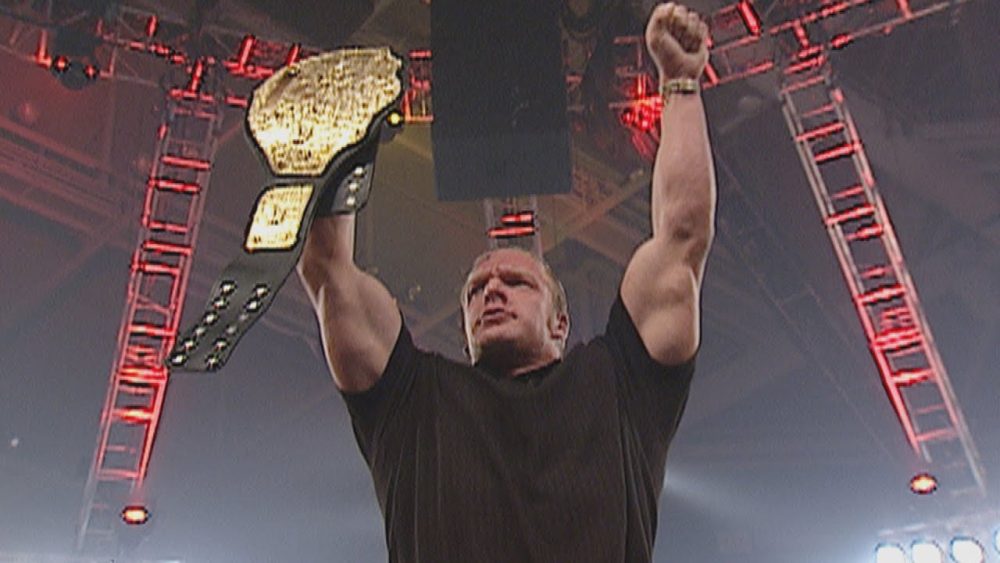
Triple H was handed the new World Heavyweight Championship on September 2, 2002 which can be a good place to begin recognizing the start of his Reign of Terror. His “Reign” would end in 2005 after creating a new star in Batista and losing to him at three consecutive PPVs, although residuals from the Reign could still be felt through 2006 when he would main event Wrestlemania again.
The most infamous trends of the time were him beginning every episode of RAW with a long, droning promo segment, equally just as dragging matches, sneaky sledgehammer shots, and tons of Evolution interference. His ego running backstage politics was also the norm it seemed, most notably the rumor that Triple H’s only question before any show was “Am I fucking going over?”
It should be noted that Triple H was no stranger to backstage politics by this time. He had married into the McMahon family by this point and was fully integrated into Vince McMahon’s inner circle. On top of that, Triple H was a core member of “The Kliq,” a group of wrestlers in the 90s who used their friendship and ties with the then-untouchable Shawn Michaels to get in Vince’s ear and have their way. The Kliq were so influential, they even had a huge role in the Montreal Screwjob, perhaps the most important and influential creative decision in the history of the company ever.
The Victims
2002
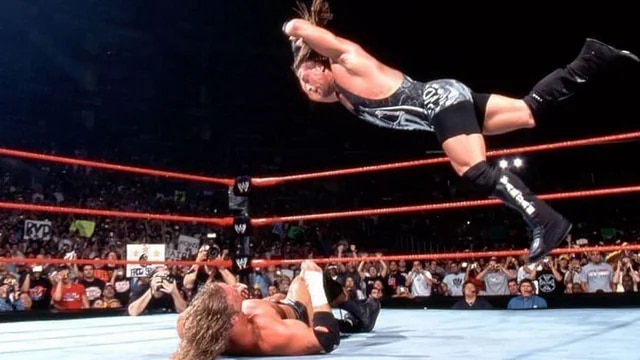
Rob Van Dam is often cited as the biggest victim of Triple H’s Reign of Terror and for good reason. It may be a bit insane to think about now, but there was a legit period of time where RVD may have been the most over man in the entire WWE during 2001 and 2002. Easily the guy who benefitted the most from the infamous Invasion storyline (hell, maybe the only major guy to really benefit from it), RVD debuted in the (then) WWF as the crown jewel of ECW’s wave of the Invasion and three months later was main eventing PPVs opposite “Stone Cold” Steve Austin.
After Trips got handed the inaugural World Heavyweight Championship in the fall of 2002, his first true rival for the gold was the incredibly popular RVD since he was naturally RAW’s top babyface. Despite RVD’s popularity the last two years, Triple H would defeat RVD at Unforgiven 2002 in the match that would plant seeds for what would become the stable Evolution, as Ric Flair and a sledgehammer show up.
Despite clearly being the best top face to oppose Triple H, RVD did not get another chance at the world title against Triple H in one-on-one fashion until the last RAW of June 2003, almost eight months later. The real dreadful capper, though, is just a month after Unforgiven 2002, Triple H would more or less squash RVD out of the main event scene with a non-title victory over him in a roughly ten minute Lumberjack Match. This was only the second most horrendous thing that happened on that particular show, however, and we will get to that shortly.
The amount of momentum lost by RVD during this showing, paired with his being shoved aside for other opponents and a broken leg, made sure Rob Van Dam didn’t get his just rewards until 2006. There, he would finally win the WWE Championship in legendary fashion at One Night Stand 2006. The sting of Van Dam’s fall to Triple H is lessened thanks to that future knowledge, but it is still damning that PWI’s Most Popular Wrestler of the Year for 2001 and 2002 never held the company’s world title(s) at that peak and wouldn’t ‘til years afterwards.
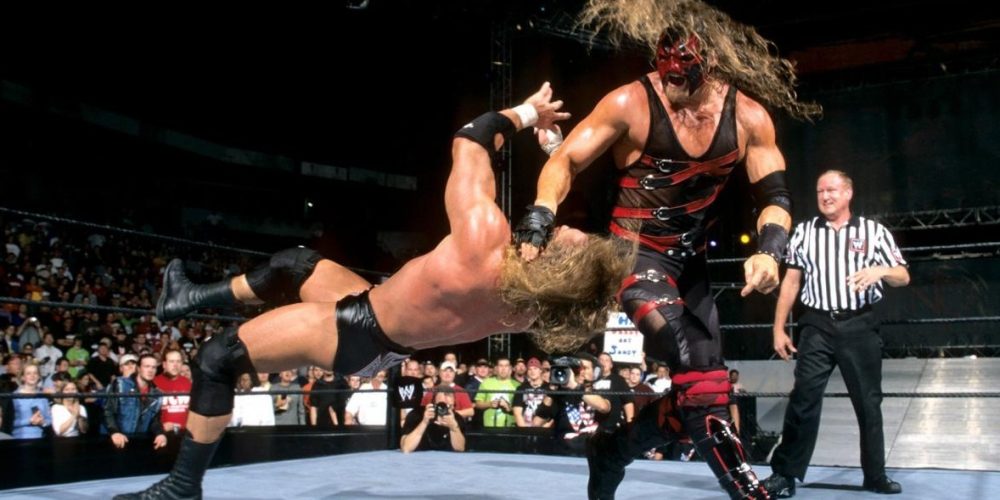
Kane was next in line after RVD failed in his challenge. That same episode of RAW in October 2002 where Triple H buried RVD in the Lumberjack Match was also the same episode that gave us two immortal, horrendous words: Katie Vick.
For those uninitiated, I end your innocence here: Katie Vick was the name of a (storyline) girlfriend from Kane’s past. One evening, she and Kane got in a car wreck, and while Kane would survive, Katie did not. Triple H and Ric Flair would mock Kane’s trauma by dressing up in a Kane mask and invading a funeral home and, well, simulate sex with a mannequin made to look like “Katie Vick.” To top it off, something came out of the body to which Triple H joked that he “screwed her brains out.” Again, I must stress, this was all in-storyline and not real in the slightest.
While this was de-emphasized leading into their match at No Mercy 2002, the fact that the name “Katie Vick” can make an entire generation of fans curdle says all you need to know about the most memorable thing from this spat. The fun part is, Kane wasn’t dumped on once but twice during the RoT.
The second one, with even longer narrative consequences than introducing necrophelia to a wrestling audience, was that Triple H managed to defeat Kane for his mask in the summer of 2003, forcing the big man to unmask and stay that way for the better part of the next decade. It was a decision that wasn’t loved at the time and was still bemoaned by many fans for years afterwards. You could even argue that Kane being unmasked was a burial of sorts for the entire Kane identity.
2003
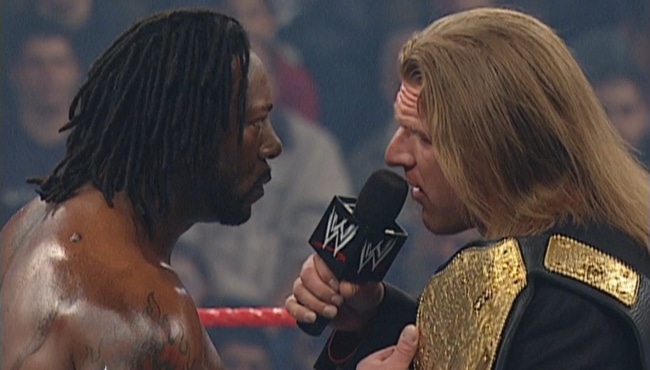
Booker T emerged from the Invasion still with a great deal of star power intact, which is honestly just a testament to how good at the craft of sports-entertainment he is. As WCW Champion when the company closed, Booker became a lightning rod for some of the worst booking of the saga as Vince McMahon looked to make an example of the WCW and ECW talent acquired. Booker’s unexpected and much-lauded “odd couple” tag team with Goldust showed many things, particularly that fans did want to connect with Booker, despite the booking meant to show him as a lesser, knock-off version of The Rock and WWE stars as a whole.
This connection reached a zenith in early 2003, where Booker T would go on to win a battle royale for a shot at Triple H and the World Heavyweight Championship at Wrestlemania 19. The conclusion of the match saw other kooky and unexpectedly incredibly over act The Hurricane help Booker last eliminate The Rock to maybe the biggest ovation in Booker’s career to that point.
What followed, however, was an infamously racist angle where Triple H used all kinds of dogwhistle words and phrases to downplay Booker and his talents. Years after the fact, Triple H and backstage minds like Bruce Prichard would deny that the storyline was ever implied to have racial under and overtones, but that’s hot fucking garbage. Moments like Triple H throwing loose change at Booker in the bathroom and telling Booker “people like you don’t become world champion” are kind of hard to parry.
Race is completely fair game to use in rasslin’ stories, but these things tend to sit better with audiences when you have the racist lose. That’s what Triple H didn’t do at Wrestlemania, going over Booker to a crowd that was ravenous for a title change. Not only did Trips go over Booker, but he hit him with a Pedigree and waited an infamous twenty-four seconds to cover Booker with a single hand to get the winning fall. This combination of actions are often cited as the most brutal and disrespectful moment of the Reign of Terror, burying any hope of Booker being taken seriously as a main eventer.
In later years, it would be reported that the original plan was to have Booker T win the world title at Wrestlemania, but WWE managed to get Goldberg under contract during the build and they wanted a heel world champion for Goldberg to chase. Considering how long they would blueball the audience about a Goldberg title reign, this explanation doesn’t seem justified. Hell, you could’ve even had Booker win the title that night and drop it back a month or two later and nothing would’ve been different except you would’ve created a new star in the process.
Much like Rob Van Dam above, it would take until the summer of 2006 for Booker to recover enough momentum to win the World Heavyweight Championship. And even that needed loads of variables spinning in Booker’s favor such as every other top name on Smackdown getting injured or retiring (namely Mark Henry, Randy Orton, Kurt Angle, and John “Bradshaw” Layfield) combined with the atrocious booking of Rey Mysterio’s first world title reign. As irony would have it, this was also probably because creative wanted a top heel to hold the title for a returning top face, in this case Batista, to chase the rest of the year, and the incredibly silly King Booker was perfect for the role.
For some added layers to that irony, the King Booker character would be buried and killed off by a completely different decimation at the hands of Triple H once again. Returning from injury at SummerSlam 2007, Triple H destroyed King Booker after the Bookerman tried to claim he was the “King of Kings” of WWE. This was the last time Booker would be seen in WWE for nearly four years.
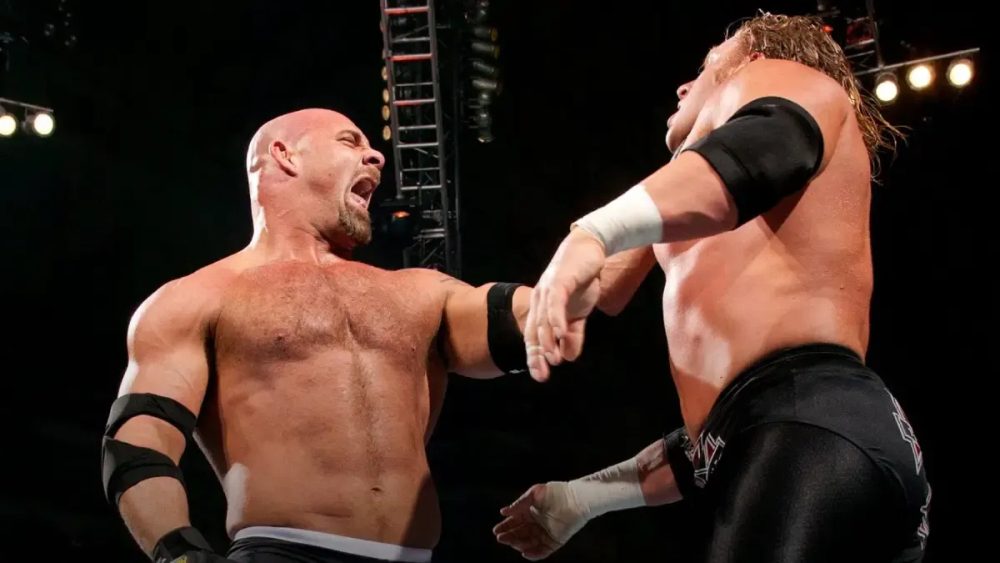
Goldberg himself was shit on by Triple H’s title reign(s) and the formation proper of Evolution, though that L can also be chalked up to WWE management itself for just how poorly handled Goldberg’s first run in the company was. After building Goldberg up following his debut the night after Wrestlemania 19 by basically having him spear everyone in half, it was inevitable that the biggest star WCW ever created would ram his way into The Game.
This chance came at SummerSlam 2003, in the second ever Elimination Chamber match. The other participants in the match were mostly irrelevant. The only thing that was significant was Triple H was going to be in a Chamber with nowhere to run, no Evolution to help him, alone, with Bill Goldberg. The booking was simple – all you had to do was have Goldberg enter the chamber last and run through everyone with spears and Jackhammers until it was just he and Triple H, where the cornered dastardly heel would finally get his comeuppance.
In fact, the build to the match was originally just Triple H vs. Goldberg 1-on-1, but as weeks went on, more stuff just got added. In addition to the above painfully obvious booking plan, it was also well-known at the time that Triple H was nursing a legitimate groin injury, which seemed to make it even more obvious that he should drop the title. The match pretty much went as lined up above until it was just ‘berg and Hunter, where Ric Flair slipped him a sledgehammer. Goldberg lined up a spear, ate sledgehammer instead, and then ate an unceremonious three count and then got the snot beat out of him by Evolution.
Goldberg would win the title a month later, but it didn’t seem to matter. The time to drop the hammer was at your second-biggest show of the year and it was likely done to, once again, spite a notable WCW star. Either that or troll the audience, which Vince is also notorious for enjoying. In any case, Goldberg would never approach the level of momentum or hype he’d amassed for the remainder of his run, especially since he would drop the title right back to Triple H.
And this is all without mentioning that Goldberg was being used in Triple H’s long, deliberate matches, which is where Goldberg just doesn’t work, so it also left him a bit exposed. Damaged goods and probably upset at how he was used, Goldberg did not renew his contract going into his infamously awful match with Brock Lesnar at Wrestlemania 20. You could argue running into Triple H hurt Goldberg so much, it killed off his interest in wrestling for more than a decade.
2004
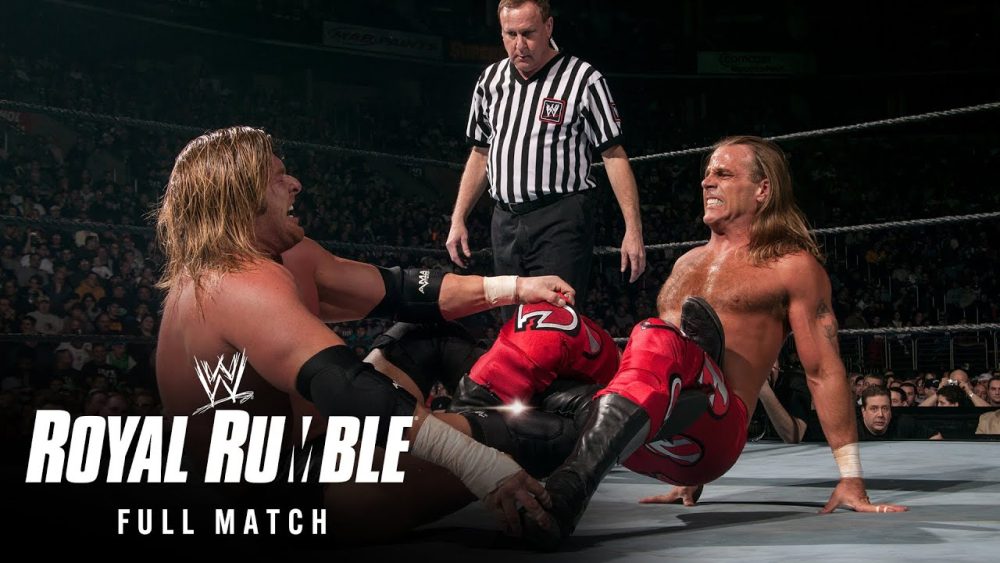
The Entire Undercard of Royal Rumble 2004 did not have a match touch double digits in time and also had the tempo of molecules in a microwave (science joke!); every match seemed to rush itself to a conclusion, even the WWE Championship match that took place just before the World Heavyweight Championship match. Granted, no one would ever believe Hardcore Holly had a prayer to become WWE Champion against Brock Lesnar, but they at least deserved some time to tell a proper story.
Every match being short and rushed can be seen as incredibly justified because the point of the Rumble is, well, the titular match itself that virtually always goes over an hour. On this year’s edition of the show, though, these match times and blazing paces stick out against the Triple H vs. Shawn Michaels Last Man Standing Match that went 20+ minutes. Even better, said match went to a draw, which meant it didn’t resolve any of the conflict it invited, ultimately didn’t mean much, and likely could’ve been better used as a conclusion to an episode of RAW.
This also highlights a constant trope across Triple H’s Reign of Terror: no one was built or designed to be his equal except for his bestie, Shawn Michaels. This show isn’t even the worst part of it; later in the year, Triple H and HBK would go on to have the longest Hell in a Cell match ever that lasted nearly an hour. Any time Triple H and Shawn seemed to lock horns, they’d seem to soak up as much airtime as they could. While Triple H was the lightning rod for much of the negative audience feelings, the entire feud is not looked fondly upon beyond the Wrestlemania 20 main event that got wrapped up in it.
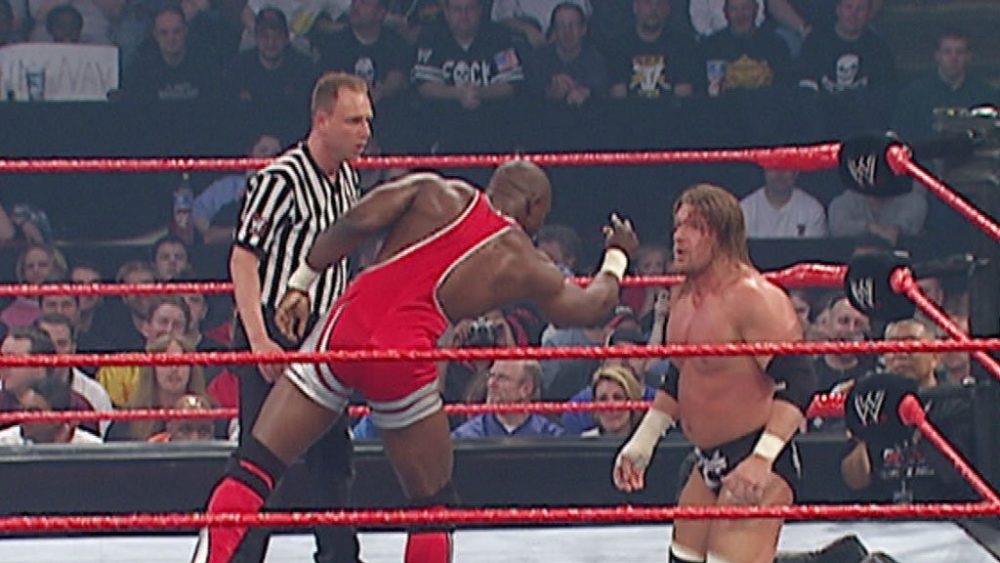
Shelton Benjamin was always missing something that prevented him from really breaking through to stardom and that something is normally attributed to his lack of ability on the microphone. However, in the spring of 2004, Benjamin got the biggest push of his career when he got several victories over one Triple H. They weren’t definitive or strong victories, sure, but wins by count-out and quick pins still count, especially with how strongly Trips was still booked and against a midcarder still trying to find his feet as a solo act at that.
A rather infamous backstage story is that when Benjamin was seeking guidance when working with Triple H, with whom he’d never worked before, he approached Shane “Hurricane” Helms. Helms would respond by simply showing him how to take the Pedigree and nothing else. Benjamin would be built up as sort of a young kryptonite to Triple H as an interesting story thread weaved throughout 2004, only to have any sort of momentum he had approaching a main eventer squashed out of him in December of that year.
There, Triple H didn’t just get one over on Benjamin, but thoroughly and decisively destroyed him in less than eight minutes, again despite Benjamin having gone 6-0 in (televised) matches involving he and Triple H all year. In hindsight, we can again criticize Benjamin’s lack of skills in a particular department to how high his ceiling really was, but at the time, such an exciting young star getting doused like that was all kinds of deflating. And speaking of young stars…
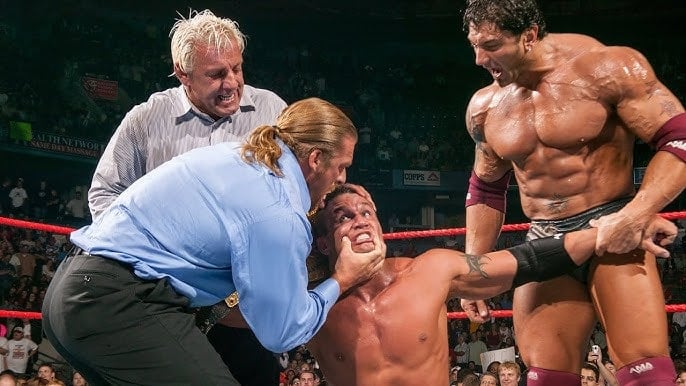
Randy Orton was the young star of young stars back in the early-to-mid 2000s after latching onto Evolution and being groomed to be the next big thing from mentors Ric Flair and Triple H. After becoming the longest reigning Intercontinental Champion in quite some time, Orton became the top contender for Benoit’s World Heavyweight Championship. Orton won pretty definitively and even shook hands with Benoit afterwards, becoming the youngest world champion in WWE history (in a petty attempt to scrub Lesnar from the record books).
And then he was unceremoniously dumped out of Evolution and went on one of the worst face runs anyone could ever have.
Orton lost the title right back to Triple H a few weeks later and became a de facto face by simply not being Triple H. Good for him, but Randy Orton was still quite the punchable, arrogant bastard in 2004. No one really wanted him to be a good guy. Triple H would destroy Orton several more times over the coming months before capping it all off by beating him one final time at Royal Rumble 2005.
If talking about the benefit of hindsight when referencing Shelton Benjamin’s lowering, we have to talk about Orton’s. Randal Keith Orton (yes, his initials spell RKO if you were unaware) is the definition of a legend in the modern day. And while his pedigree (no pun intended) virtually guaranteed he’d see some time in WWE, it also doesn’t guarantee overwhelming success.
Think about if Orton’s big title win and the fallout was all he’d ever do; if he never recovered from such terrible handling. It’s also something to note that for as much a hand in Triple H had in Orton’s rise to the success both on-screen and off, it was at his own hand that his protege was sacrificed.
Thankfully, a few weeks later, Orton would turn heel once again by being corrupted by the allure of being the man to finally defeat The Undertaker at Wrestlemania. Not only was that the angle that “The Streak” became “The Streak,” but Orton’s program with the Deadman would, ironically, revive his entire standing in the company and set him on track to the legend we recognize today.
Honorable Mentions: Talent who were run over by the H-Man over the course of his domination, but for one reason or another, didn’t exactly suffer as much as those above.
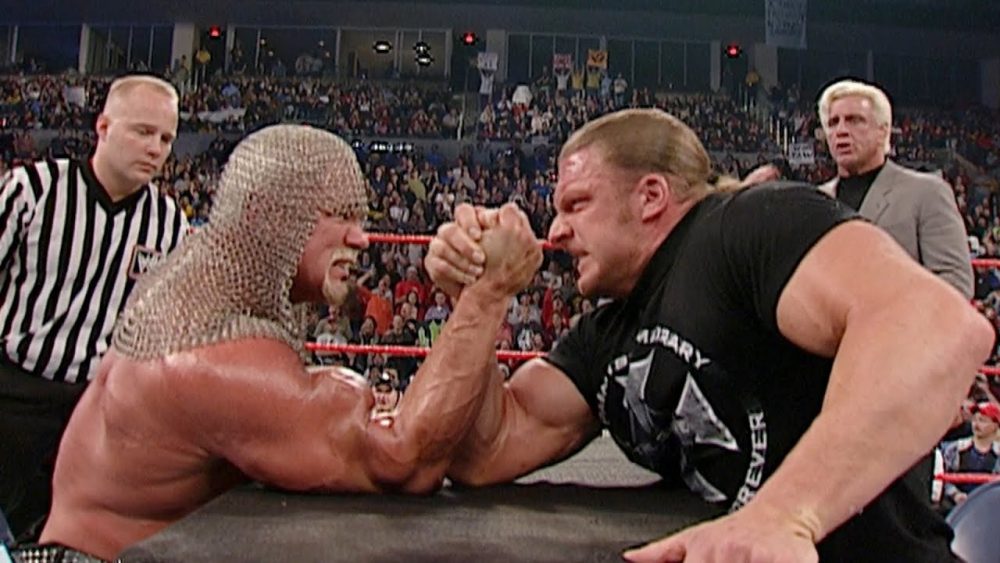
Scott Steiner, the iconic musclehead motormouth, debuted (or rather, re-debuted after several years away) at Survivor Series 2002 and immediately was involved in promos and segments that would become the bedrock of professional wrestling internet memes. Famously getting caught on the live ring microphones to “GIMMIE A F*CKIN’ MIC!” the second he stepped into the ring and being established as a face by getting into debates about the Iraq War, Steiner was set to take on Triple H going into the new year.
Unfortunately for literally everyone, the way this feud was built up was with some of the most boring segments of the era. Arm wrestling, bench press competitions, and bodybuilder flex-offs were the recipe for which this feud was cooked. Combine everyone’s fatigue with Triple H hogging the spotlight with segments not highlighting either man’s strengths already made the match at Royal Rumble 2003 a dead duck before it even happened. Then the bell rang and was somehow worse than anyone could imagine because Steiner legitimately got completely gassed just a few minutes in.
This was rectified by having a re-match the very next month that was pretty much just as bad. With that as the set-up, you could possibly see why the audience was desperate for someone like Booker T to see if they could take down Hunter come that Wrestlemania. Steiner seemed to lose favor with WWE brass after that main event program and wouldn’t really come close to the title ever again. With the benefit of history and hindsight, he might be someone who actually bizarrely benefitted from being a victim of the Reign because it eventually led him to TNA where he would reach legendary meme factory status.
Chris Benoit never had the raw star power of someone like Goldberg or perhaps even Rob Van Dam, but he was absolutely someone who connected with the crowd. Enough so that he won the 2004 Royal Rumble and went on to main event WM 20 against Triple H and Shawn Michaels, famously sharing his spotlight and confetti with best friend Eddie Guerrero in an image that has become horribly tragic and tainted in the minds of many fans.
The thing is, even though Benoit did get multiple wins over Triple H including making The Game tap out at Wrestlemania and even an Ironman match victory, Benoit was never booked to be quite on the same level as Triple H. This was made evident when Benoit dropped the world title at SummerSlam 2004 not to Triple H, but to his protege Randy Orton. A month after main eventing the second biggest PPV of the year, Benoit would be curtain jerking alongside William Regal and would never again be seen as a legitimate threat to Evolution despite all the build up his initial title win had.
Eugene is an act that the less is said about, the better perhaps. A “special needs” character who was introduced as the nephew of RAW General Manger Eric Bischoff, Eugene was a highly impressionable man who needed constant guidance. William Regal was given the role of caretaker for “Young Master Eugene,” turning the pompous Brit face as he genuinely grew to care for his charge.
Unfortunately, Eugene would get into the wrong crowd, as he started buddying up with Evolution not long after he debuted after Wrestlemania 20 in 2004. Not in a genuine way; Triple H and the gang were clearly bullying Eugene, who was too innocent to notice their mockery. This would come to a head at SummerSlam 2004 when Eugene finally fended for himself.
This one is hard to call an outright “burial” since the character in question was in a) such poor taste anyway and b) had a low ceiling, but considering how much airtime the Eugene story ate up at the time, pairing him with Evolution seemed like a way to me give Triple H more exposure by putting him in a program with management’s newest favorite toy. Eugene as a whole would wear out his welcome by the next summer (not helped by a Drug and Wellness Policy suspension) but would somehow stick around until around 2007.
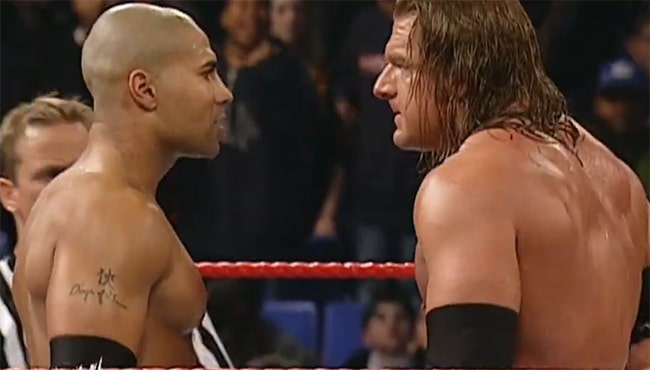
Maven was the male winner of the first ever Tough Enough, WWE’s reality show competition that awarded the winner(s) WWE contracts. Outside of his iconic elimination of The Undertaker in the 2002 Royal Rumble and a few Hardcore Championship turns, he never had the most to write home about and wasn’t portrayed as anything higher than a lower midcarder. He was on Team Orton at Survivor Series 2004, however, which allowed him to be the first person to act as RAW General Manager while Bischoff went on vacation.
He used his power to book himself into a World Heavyweight Championship opportunity in the main event that evening, despite still having hella battle scars from the night before. All the members of Team Orton interfered on his behalf, and despite all the help, Maven still went down with a single Pedigree. While clearly a “victim” in the sense of being just another tally on the wall for Triple H’s ambitions, Maven wasn’t exactly treated like a possible main eventer up to that point (or ever again).







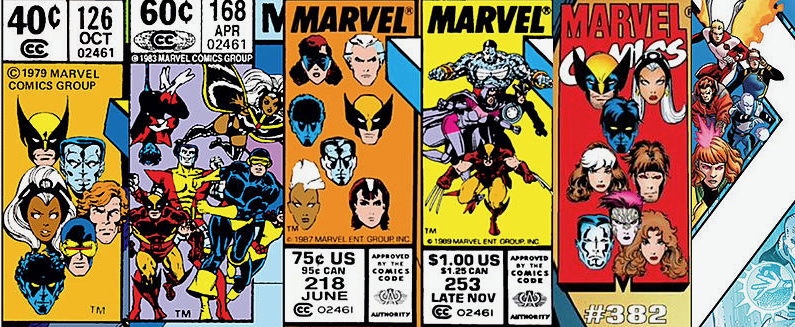








!["Superman" (2025) Brings Heart, High Stakes, and Surprising Twists [SPOILER-FILLED REVIEW]](https://www.supermansupersite.com/Superman_2025_Retro_Poster.jpg)
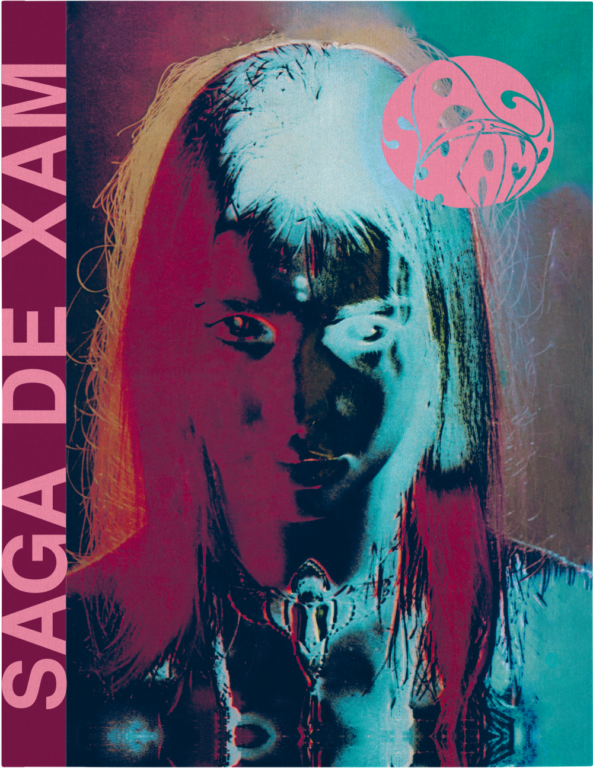



 English (US) ·
English (US) ·